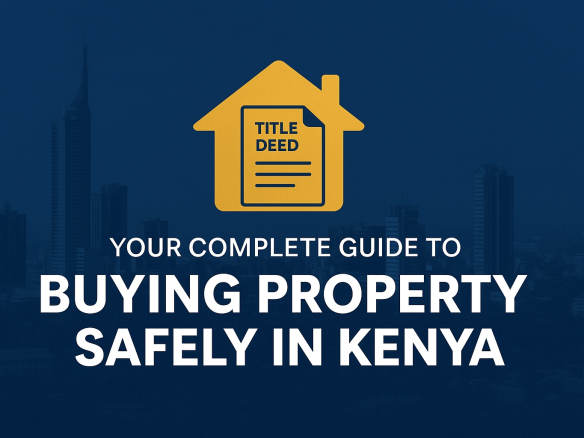The Process of Land Conveyancing in Kenya (Step-by-Step Guide)
Land conveyancing in Kenya refers to the legal process of transferring ownership of land or property from one party (the seller) to another (the buyer). It is a critical stage in any real estate transaction that ensures the buyer receives a valid, clean, and undisputed title deed.
Whether you’re buying residential land, agricultural property, or a commercial plot, understanding how conveyancing works helps you avoid fraud, double ownership, and future disputes.
Below is a detailed step-by-step guide on the land conveyancing process in Kenya, designed to help property buyers and investors make informed decisions.
1. Offer and Acceptance
The process begins when a buyer expresses interest in purchasing a particular parcel of land or property. The seller provides key details such as the plot size, location, title number, and asking price.
Once the buyer and seller agree on the purchase price and terms, a formal offer and acceptance are made—either verbally or in writing. This initial stage sets the foundation for the transaction and allows both parties to engage their respective advocates or real estate agents to proceed with the legal process.
Tip: It’s advisable to involve a licensed real estate agent or registered valuer early in the process to confirm the property’s market value and guide negotiations.
2. Preparation of the Sale Agreement
Once there’s mutual agreement on the price, the seller’s advocate drafts a Sale Agreement (or Agreement for Sale). This legally binding contract outlines:
The full names and ID numbers of both parties.
The property details (land reference number, location, and size).
The purchase price and payment terms.
Completion timelines and any conditions precedent.
Obligations of both the buyer and seller.
Default clauses in case of breach by either party.
The buyer’s advocate reviews the agreement and may suggest amendments before both parties sign it. At this stage, the buyer typically pays a deposit—often 10% of the total price—into an advocate’s client account as security.
3. Conducting Due Diligence
Before making any major payment, the buyer must carry out comprehensive due diligence to confirm that the property is legitimate and free from encumbrances. This is the most crucial step in land conveyancing.
The due diligence process includes:
Official Land Search at the Lands Registry to confirm ownership and check for any registered charges, caveats, or restrictions.
Verification of Title Deed and Land Reference Number to ensure authenticity.
Survey Verification by a licensed surveyor to confirm boundaries and acreage.
Rates and Land Rent Clearance Certificates from the local county government and Ministry of Lands.
Physical Site Visit to confirm the location, access roads, and any existing developments.
Historical Ownership Verification (especially for ancestral or subdivided land) to ensure the seller has the right to sell.
Note: Engaging a registered valuer or property consultant helps confirm the land’s market value and prevents overpayment.
4. Payment of Deposit
Once due diligence confirms that the land is clean and legitimate, the buyer pays the agreed deposit, usually 10% of the total purchase price.
This deposit is often held in the seller’s advocate’s escrow account or stakeholder account pending completion. This protects the buyer’s interests in case the seller fails to meet their obligations, such as providing original documents or transfer consent.
5. Valuation and Stamp Duty Assessment
Before transfer, the property must be valued for stamp duty assessment by the Ministry of Lands and Physical Planning. The buyer’s advocate applies for a valuation through the Kenya Revenue Authority (KRA) portal.
A government valuer then inspects the property and determines its current market value for the purpose of calculating stamp duty — a mandatory tax payable on property transfers.
The rates are as follows:
Urban property: 4% of the property’s value
Agricultural or rural land: 2% of the property’s value
Once the valuation is complete, KRA issues a valuation report and a payment slip for stamp duty.
6. Payment of Stamp Duty
The buyer proceeds to pay the assessed stamp duty through an approved bank or online via the iTax system.
Upon payment, KRA stamps the transfer documents as proof that the tax obligation has been fulfilled. Stamped documents are then ready for registration at the Lands Registry.
Other costs at this stage may include legal fees, registration fees, search fees, and land rent/rates arrears if any are outstanding.
7. Transfer and Registration of Title
Once the stamp duty is paid, the seller signs the transfer documents, which the buyer’s advocate submits to the Lands Registry alongside the following:
Original title deed
Duly filled transfer form (Form RL7)
Land rent and rates clearance certificates
Consent to transfer (if applicable, e.g., for leasehold or agricultural land)
Stamped Sale Agreement
Copy of PIN Certificates and ID cards for both parties
The Lands Registry verifies all documents, processes the transfer, and issues a new title deed in the buyer’s name. This step legally finalizes the conveyancing process.
8. Handover and Possession
After registration, the buyer officially becomes the legal owner of the land. The seller hands over:
The new title deed (now in the buyer’s name)
Land maps, beacons certificate, and any relevant documents
Vacant possession of the property
The buyer then pays the balance of the purchase price as agreed in the Sale Agreement. The conveyancing transaction is now fully complete, and the buyer can proceed to develop, lease, or resell the property.
The land conveyancing process in Kenya is detailed but essential for protecting your investment. It ensures that land ownership is transferred legally, transparently, and securely.
To avoid legal complications, buyers are strongly advised to engage qualified real estate consultants, registered valuers, and conveyancing advocates who understand the Kenyan property market and land laws.
Whether purchasing land in Nairobi, Kilifi, Mombasa, or any other part of Kenya, following this structured conveyancing process helps you achieve a smooth, safe, and compliant property transfer.





Join The Discussion